Unit-5-Do-you-have-a-soccer-ball-词句精讲精练
- 格式:doc
- 大小:50.50 KB
- 文档页数:7
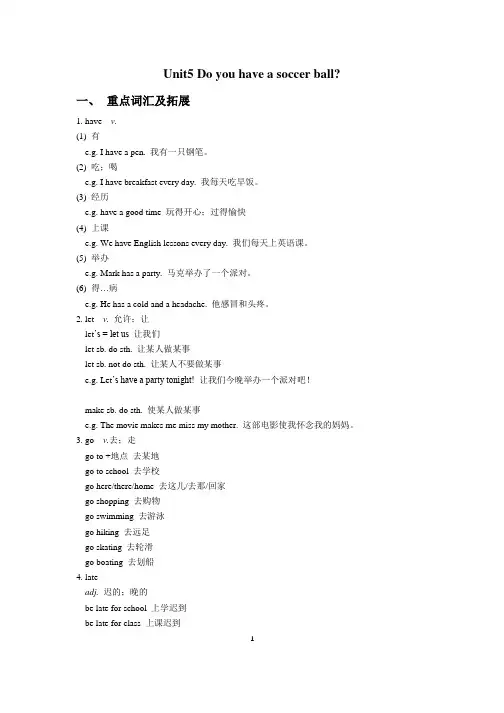
Unit5 Do you have a soccer ball?一、重点词汇及拓展1. have v.(1) 有e.g. I have a pen. 我有一只钢笔。
(2) 吃;喝e.g. I have breakfast every day. 我每天吃早饭。
(3) 经历e.g. have a good time 玩得开心;过得愉快(4) 上课e.g. We have English lessons every day. 我们每天上英语课。
(5) 举办e.g. Mark has a party. 马克举办了一个派对。
(6) 得…病e.g. He has a cold and a headache. 他感冒和头疼。
2. let v.允许;让let’s = let us 让我们let sb. do sth. 让某人做某事let sb. not do sth. 让某人不要做某事e.g. Let’s have a party tonight! 让我们今晚举办一个派对吧!make sb. do sth. 使某人做某事e.g. The movie makes me miss my mother. 这部电影使我怀念我的妈妈。
3. go v.去;走go to +地点去某地go to school 去学校go here/there/home 去这儿/去那/回家go shopping 去购物go swimming 去游泳go hiking 去远足go skating 去轮滑go boating 去划船4. lateadj. 迟的;晚的be late for school 上学迟到be late for class 上课迟到1be late for work 上班迟到adv. 迟地;晚地later adv. 后来;以后e.g. Three days later, he found his father. (句中有段时间+later,句子用一般过去时)三天后,他找到了他的爸爸。
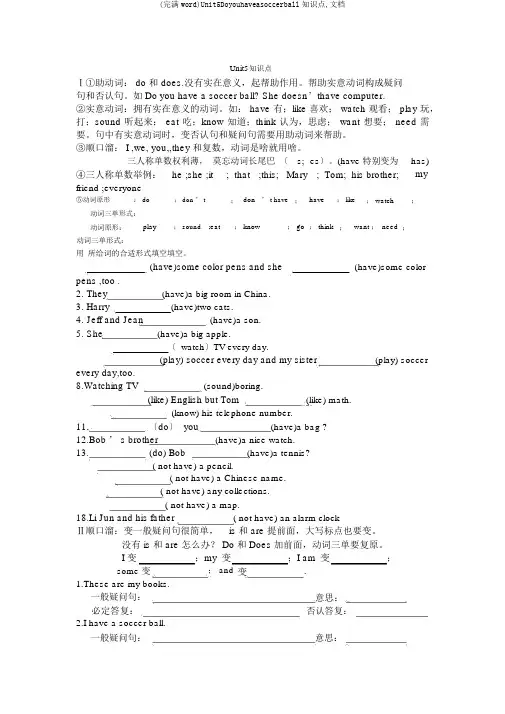
Unit5知识点Ⅰ①助动词: do 和 does.没有实在意义,起帮助作用。
帮助实意动词构成疑问句和否认句。
如 Do you have a soccer ball? She doesn’thave computer.②实意动词:拥有实在意义的动词。
如: have 有;like 喜欢; watch 观看; play 玩,打;sound 听起来; eat 吃;know 知道;think 认为,思虑; want 想要; need 需要。
句中有实意动词时,变否认句和疑问句需要用助动词来帮助。
③顺口溜: I ,we, you,,they 和复数,动词是啥就用啥。
三人称单数权利薄,莫忘动词长尾巴〔 --s;--es〕。
(have 特别变为④三人称单数举例:he ;she ;it ; that ;this; Mary ; Tom; his brother;has) myfriend ;everyone⑤动词原形: do; don ’ t;don’ t have;have; like; watch;动词三单形式:动词原形:play; sound;eat; know; go; think;want ;need;动词三单形式:用所给词的合适形式填空填空。
(have)some color pens and she(have)some color pens ,too .2. They(have)a big room in China.3. Harry(have)two cats.4. Jeff and Jean(have)a son.5. She(have)a big apple.〔watch〕TV every day.(play) soccer every day and my sister(play) soccer every day,too.8.Watching TV(sound)boring.(like) English but Tom(like) math.(know) his telephone number.11.〔do〕 you(have)a bag ?12.Bob ’ s brother(have)a nice watch.13.(do) Bob(have)a tennis?( not have) a pencil.( not have) a Chinese name.( not have) any collections.( not have) a map.18.Li Jun and his father( not have) an alarm clockⅡ顺口溜:变一般疑问句很简单,is 和 are 提前面,大写标点也要变。
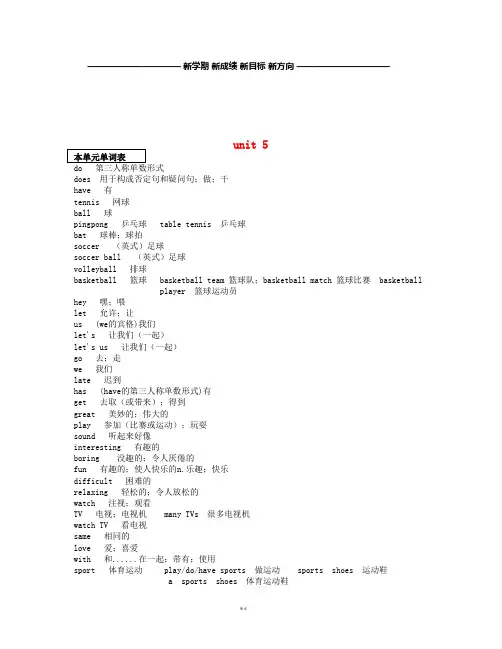
——————————新学期新成绩新目标新方向——————————unit 5does 用于构成否定句和疑问句;做;干have 有tennis 网球ball 球pingpong 乒乓球 table tennis 乒乓球bat 球棒;球拍soccer (英式)足球soccer ball (英式)足球volleyball 排球basketball 篮球 basketball team 篮球队;basketball match 篮球比赛 basketball player 篮球运动员hey 嘿;喂let 允许;让us (we的宾格)我们let's 让我们(一起)let's us 让我们(一起)go 去;走we 我们late 迟到has (have的第三人称单数形式)有get 去取(或带来);得到great 美妙的;伟大的play 参加(比赛或运动);玩耍sound 听起来好像interesting 有趣的boring 没趣的;令人厌倦的fun 有趣的;使人快乐的n.乐趣;快乐difficult 困难的relaxing 轻松的;令人放松的watch 注视;观看TV 电视;电视机 many TVs 很多电视机watch TV 看电视same 相同的love 爱;喜爱with 和......在一起;带有;使用sport 体育运动 play/do/have sports 做运动 sports shoes 运动鞋a sports shoes 体育运动鞋them (they的宾格)他(她、它)们only 只;仅like 喜欢;喜爱easy 容易的;不费力的after 在......以后class 班级;课(近义词:lessen);等级;类别;阶段classmate 同班同学 roommate 室友 workmate 同事 deskmate 同桌schoolmate 校友Bill 比尔(男名)on的用法,详见unit4【解析】on可以表示“通过;使用……方式”,后面通常接表示通信工具的名词。
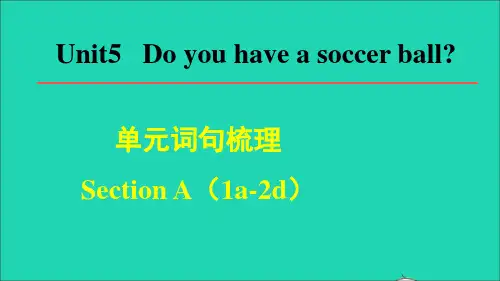
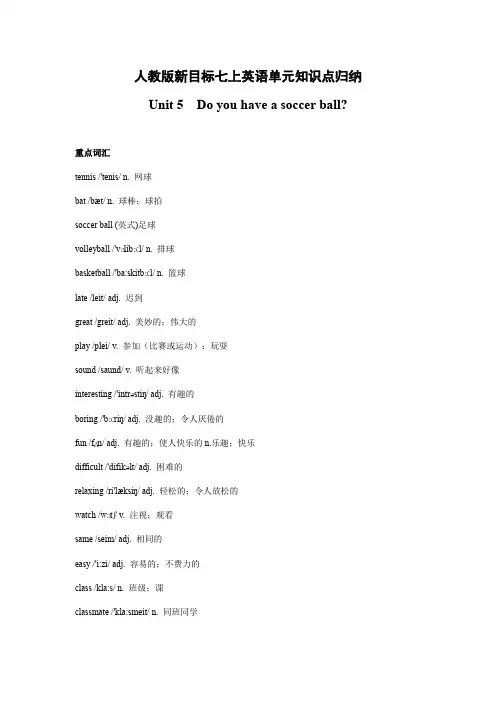
人教版新目标七上英语单元知识点归纳Unit 5 Do you have a soccer ball?重点词汇tennis/'tenis/ n. 网球bat /bæt/ n. 球棒;球拍soccer ball (英式)足球volleyball/'vɔlibɔ:l/ n. 排球basketball/'ba:skitbɔ:l/ n. 篮球late/leit/ adj. 迟到great/greit/ adj. 美妙的;伟大的play/plei/ v. 参加(比赛或运动);玩耍sound/saund/ v. 听起来好像interesting/'intrəstiŋ/ adj. 有趣的boring/'bɔ:riŋ/ adj. 没趣的;令人厌倦的fun/fʌn/ adj. 有趣的;使人快乐的n.乐趣;快乐difficult/'difikəlt/ adj. 困难的relaxing/ri'læksiŋ/ adj. 轻松的;令人放松的watch/wɔtʃ/ v. 注视;观看same/seim/ adj. 相同的easy/'i:zi/ adj. 容易的;不费力的class/kla:s/ n. 班级;课classmate/'kla:smeit/ n. 同班同学重点短语:a tennis bat 一个网球拍play basketball 打篮球baseball bat 棒球棒have a soccer ball 有一个足球play soccer 踢足球with our friends 和我们的朋友一起have a ping-pong ball 有一个乒乓球play ping-pong 打乒乓球have a volleyball 有一个排球play volleyball 打排球at school 在校,上学play sports 做运动watch TV 看电视in my bag 在我的包里be late 迟到on TV 电视上必背典句:1. Do you have a soccer ball? 你有一个足球吗?2. Does he/she have a ping-pong ball?他/她有一个乒乓球吗?3. Do you play sports with your classmates? 你和你的同学一起做运动吗?4. Let’s play soccer together! 我们一起踢足球吧!5. How many sports do you like?你喜欢多少种运动?6. I like playing soccer and basketball. 我喜欢踢足球和打篮球。
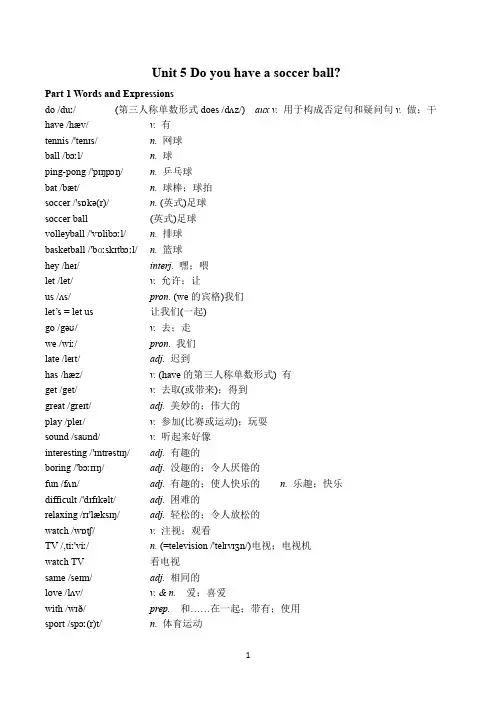
Unit 5 Do you have a soccer ball?Part 1 Words and Expressionsdo /duː/ (第三人称单数形式does /dʌz/) aux v.用于构成否定句和疑问句v.做;干have /hæv/ v.有tennis /'tenɪs/ n. 网球ball /bɔːl/ n.球ping-pong /'pɪŋpɔŋ/ n. 乒乓球bat /bæt/ n. 球棒;球拍soccer /'sɒkə(r)/ n. (英式)足球soccer ball (英式)足球volleyball /'vɒlibɔːl/ n.排球basketball /'bɑːskɪtbɔːl/ n.篮球hey /heɪ/ interj.嘿;喂let /let/ v. 允许;让us /ʌs/ pron. (we的宾格)我们let’s = let us 让我们(一起)go /gəʊ/ v.去;走we /wiː/ pron.我们late /leɪt/ adj. 迟到has /hæz/ v. (have的第三人称单数形式) 有get /get/ v.去取(或带来);得到great /greɪt/ adj.美妙的;伟大的play /pleɪ/ v. 参加(比赛或运动);玩耍sound /saʊnd/ v.听起来好像interesting /'ɪntrəstɪŋ/ adj.有趣的boring /'bɔːrɪŋ/adj.没趣的;令人厌倦的fun /fʌn/ adj.有趣的;使人快乐的n.乐趣;快乐difficult /'dɪfɪkəlt/ adj. 困难的relaxing /rɪ'læksɪŋ/ adj.轻松的;令人放松的watch /wɒtʃ/ v.注视;观看TV /,tiː'viː/ n. (=television /'telɪvɪʒn/)电视;电视机watch TV看电视same /seɪm/ adj. 相同的love /lʌv/ v. & n. 爱;喜爱with /wɪð/ prep.和……在一起;带有;使用sport /spɔː(r)t/ n. 体育运动them /ðəm/ pron. (they的宾格) 他(她、它)们only /'əʊnli/ adv.只;仅like /laɪk/ v. 喜欢;喜爱easy /'iːzi/ adj.容易的;不费力的after /'ɑːftə(r)/prep. & conj.在……之后class /klɑːs/ n.班级;课classmate /'klɑːsmeɪt/ n.同班同学Bill /bɪl/比尔(男名)Part 2:Texts课文(一)Cindy:Hey, Helen, let’s go! We’re late!Helen: OK.Cindy: Do you have the baseball?Helen: Yes, I do. It’s in my bag.Cindy: And where’s our baseball bat?Helen: Bill has it.Cindy: Oh, yeah. And do you have your jacket?Helen: Oh, no, I don’t. It’s on the chair. Let me get it. Cindy: And your hat, too!Helen: OK, I have my jacket and hat. Let’s go!Structure1. Do you have a baseball?Yes, I do./No, I don’t. I have a volleyball.2. Do you have a ping-pong bat?Yes, I do./No, I don’t. I have a ping-pong ball.3. Does she have a tennis ball?Yes, she does./No, she doesn’t. She has a baseball.4. Does he have a soccer ball?Yes, he does./No. he doesn’t. He has two ping-pong bats. 5. Do they have a basketball?句型:—Do/Does sb. have…?—Yes, sb. do / does.—No, sb. don’t / doesn’t.Write each word in the correct place in the chart.将方框中的单词填入表格中正确的位置。
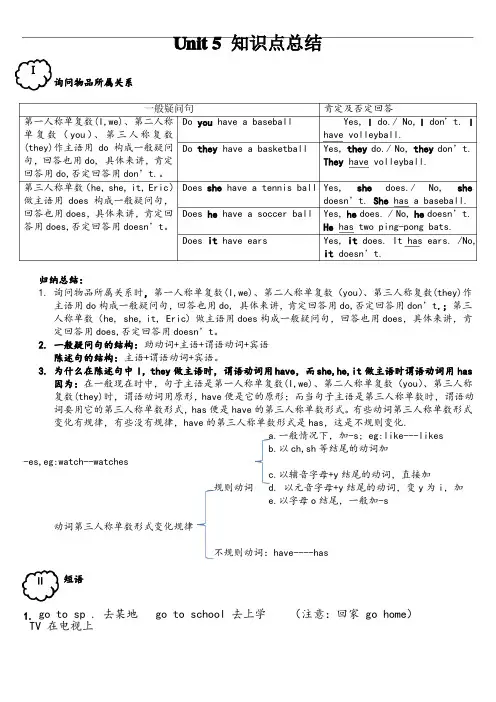
Unit 5知识点总结Ⅰ询问物品所属关系一般疑问句第一人称单复数(I,we)、第二人称Do you have a baseball单复数(you)、第三人称复数(they)作主语用do构成一般疑问Do they have a basketball 句,回答也用do,具体来讲,肯定回答用do,否定回答用don’t.。
第三人称单数(he,she,it,Eric)Does she have a tennis ball 做主语用does构成一般疑问句,回答也用does,具体来讲,肯定回Does he have a soccer ball 答用does,否定回答用doesn’t。
Does it have ears 肯定及否定回答Yes,I do./ No,I don’t. I have volleyball.Yes,they do./No,they don’t. They have volleyball.Yes,she does./No,she doesn’t.She has a baseball. Yes,he does./No,he doesn’t. He has two ping-pong bats. Yes,it does. It has ears. /No, it doesn’t.归纳总结:1.询问物品所属关系时,第一人称单复数(I,we)、第二人称单复数(you)、第三人称复数(they)作主语用do构成一般疑问句,回答也用do,具体来讲,肯定回答用do,否定回答用don’t.;第三人称单数(he, she,it, Eric)做主语用does构成一般疑问句,回答也用does,具体来讲,肯定回答用does,否定回答用doesn’t。
2.一般疑问句的结构:助动词+主语+谓语动词+宾语陈述句的结构:主语+谓语动词+宾语。
3.为什么在陈述句中I,they做主语时,谓语动词用have,而she,he,it做主语时谓语动词用has因为:在一般现在时中,句子主语是第一人称单复数(I,we)、第二人称单复数(you)、第三人称复数(they)时,谓语动词用原形,have便是它的原形;而当句子主语是第三人称单数时,谓语动词要用它的第三人称单数形式,has便是have的第三人称单数形式。
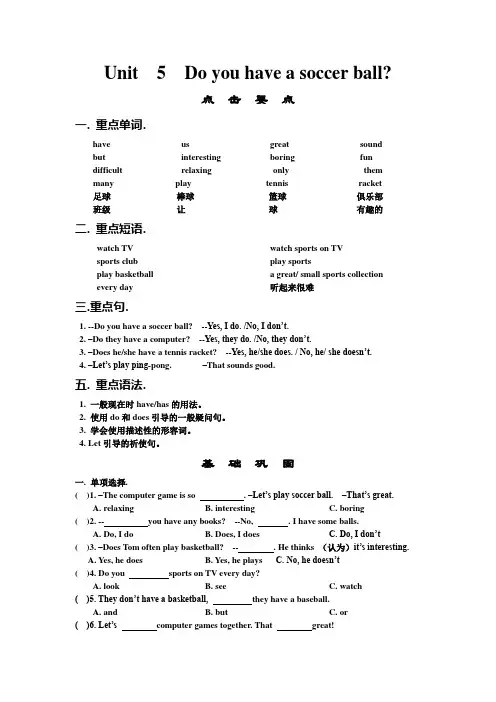
Unit 5 Do you have a soccer ball?点击要点一. 重点单词.have us great soundbut interesting boring fundifficult relaxing only themmany play tennis racket足球棒球篮球俱乐部班级让球有趣的二. 重点短语.watch TV watch sports on TVsports club play sportsplay basketball a great/ small sports collectionevery day 听起来很难三.重点句.1. --Do you have a soccer ball? --Yes, I do. /No, I don’t.2. –Do they have a computer? --Yes, they do. /No, they don’t.3. –Does he/she have a tennis racket? --Yes, he/she does. / No, he/ she doesn’t.4. –Let’s play ping-pong. –That sounds good.五. 重点语法.1. 一般现在时have/has的用法。
2. 使用do和does引导的一般疑问句。
3. 学会使用描述性的形容词。
4. Let引导的祈使句。
基础巩固一. 单项选择.( )1. –The computer game is so . –Let’s play soccer ball. –That’s great.A. relaxingB. interestingC. boring( )2. -- you have any books? --No, . I have some balls.A. Do, I doB. Does, I doesC. Do, I don’t ( )3. –Does Tom often play basketball? -- . He thinks (认为)it’s interesting.A. Yes, he doesB. Yes, he playsC. No, he doesn’t( )4. Do you sports on TV every day?A. lookB. seeC. watch( )5. They don’t have a basketball, they have a baseball.A. andB. butC. or( )6. Let’s computer games together. That great!A. play, soundB. watches, soundsC. play, sounds( )7. My sister a new computer, but I .A. has, don’tB. have, doesn’tC. doesn’t have, does ( )8. She TV .A watch, every day B. watches, everyday C. watches, every day ( )9.We have sports clubs: basketball, ping-pong, soccer, and .A. many, muchB. many, moreC. much, more( )10. Can I the basketball club?A. joinB. to joinC. join in( )11. –Can you draw(画) pictures? --No, I can’t. It is very .A. funB. niceC. difficult( )12. Sue a small sports collection. She plays every day.A. have, sportB. plays, sportsC. has, sports( )13. But he doesn’t play sports –he watches them on TV!A.orB. onlyC. too( )14. Nancy likes playing ping-pong, but she doesn’t like playing computer games at home.A. the, theB. the, /C. /, /二.用have, has, do, does填空.1. My father a big sports collection.2. he have a soccer ball?3. Do you a tennis racket?4. Jimmy two English books.5. What you think of the idea?6. Mary a computer.7. She many new books.8. We only one earth.(地球)9. he have a dog?三. 单句改错。
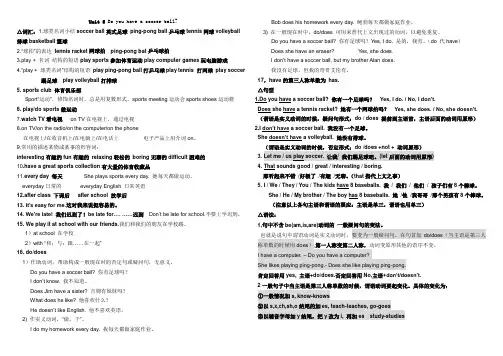
Unit 5 Do you have a soccer ball?△词汇:1.球类名词小结soccer ball英式足球ping-pong ball乒乓球tennis网球volleyball 排球basketball篮球2.“球拍”的表达tennis racket网球拍ping-pong bat乒乓球拍3.play + 名词结构的短语play sports参加体育运动play computer games玩电脑游戏4.“play + 球类名词”结构的短语play ping-pong ball打乒乓球play tennis 打网球play soccer踢足球play volleyball打排球5. sports club 体育俱乐部Sport“运动”,修饰名词时,总是用复数形式。
sports meeting运动会sports shoes运动鞋6.play/do sports做运动7.watch TV看电视on TV在电视上,通过电视8.on TV/on the radio/on the computer/on the phone在电视上/在收音机上/在电脑上/在电话上电子产品上用介词on。
9.常用的描述某物或某事的形容词:interesting有趣的fun有趣的relaxing轻松的boring无聊的difficult困难的10.have a great sports collection有大量的体育收藏品11.every day 每天She plays sports every day. 她每天都做运动。
everyday日常的everyday English 日常英语12.after class 下课后after school 放学后13. It’s easy for me.这对我来说挺容易的。
14. We’re late! 我们迟到了!be late for…. ……迟到Don’t be late for school.不要上学迟到。
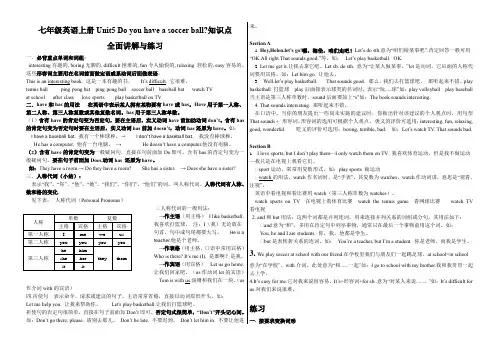
七年级英语上册Unit5 Do you have a soccer ball?知识点全面讲解与练习一.必背重点单词和词组:interesting有趣的, boring无聊的, difficult困难的, fun令人愉快的, relaxing轻松的,easy容易的。
这些形容词主要用在名词前面做定语或系动词后面做表语。
This is an interesting book. 这是一本有趣的书。
It’s difficult. 它很难。
tennis ball ping-pong bat ping-pong ball soccer ball baseball bat watch TVat school after class love sports play basketball on TV二.have和has的用法在英语中表示某人拥有某物要有have或has。
Have用于第一人称、第二人称、第三人称复数或其他复数名词。
has用于第三人称单数。
(1)含有have的肯定句变为否定句,要在主语后,实义动词have前加助动词don’t。
含有has 的肯定句变为否定句时要在主语后,实义动词has前加doesn’t,动词has还原为have。
如:I have a baseball bat. 我有一个棒球棒。
→I don’t have a baseball bat.我没有棒球棒。
He has a computer. 他有一台电脑。
→ He doesn’t have a computer.他没有电脑。
(2)含有have的肯定句变为一般疑问句,直接在句前面加Do即可。
含有has的肯定句变为一般疑问句,要在句子前面加Does,动词has 还原为have。
如:They have a room.→ Do they have a room? She has a sister. → Does she have a sister?三.人称代词(小结):表示“我”、“你”、“他”、“她”、“我们”、“你们”、“他们”的词,叫人称代词。
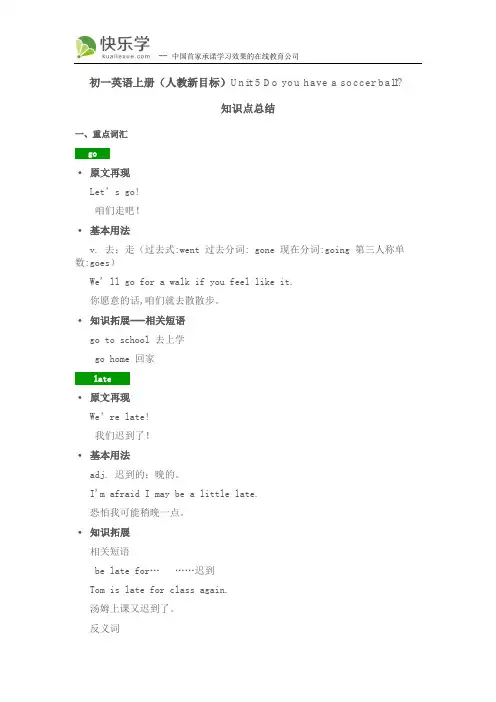
初一英语上册(人教新目标)Unit 5 Do you have a soccer ball?知识点总结一、重点词汇go· 原文再现Let’s go!咱们走吧!· 基本用法v. 去;走(过去式:went 过去分词: gone 现在分词:going 第三人称单数:goes)We' ll go for a walk if you feel like it.你愿意的话,咱们就去散散步。
· 知识拓展---相关短语go to school 去上学go home 回家late· 原文再现We’re late!我们迟到了!· 基本用法adj. 迟到的;晚的。
I'm afraid I may be a little late.恐怕我可能稍晚一点。
· 知识拓展相关短语be late for… ……迟到Tom is late for class again.汤姆上课又迟到了。
反义词early 早的She gets up early every morning.她每天早上很早起床。
其他词性adv. late 迟地,晚地,指比预定的时间或一般情况晚。
Don't get up late tomorrow. We'll have a meeting.明天别起晚,我们有会。
get· 原文再现Let me get it.让我去拿它吧。
· 基本用法vt. 去取;得到;购买;收到(过去式:got 过去分词: gotten/got 现在分词: getting第三人称单数:gets)When can I get your letter?我什么时候收到你的信?· 知识拓展---相关短语1. get up 起床I usually get up at 7:00 o'clock.我通常7点起床。
2. get on 上(车、船、飞机等)The bus is coming. Let's get on the bus.车来了,我们上车。
Unit 5 Do you have a soccer ball?【短语归纳】1.soccer ball(英式)足球 6. in my bag在我的包里2.at school在学校 7. watch TV看电视3.let's=let us让我们(一起) 8.on TV电视上4.play basketball打篮球 9.be late迟到5.play computer games玩电脑游戏 10.after class课后【单元知识点】1. Do you have …? Yes,l do. No I don't.你有…吗?是的,我有不,我没有Do they have…? Yes, they do No, they don t.Does he have …? Yes. he does. No, he doesn’t Does she have…? Yes, she does. No, she doesn't 在一般现在时中,句子的谓语动词若是实义动词,常用助动词do或does 来构成否定句或疑问句,Does用于主语是第三人称单数的句子中,其他情况用do.2.do/does1)作助动词,帮助构成一般现在时的否定句或疑问句,无意义Do you have a soccer ball你有足球吗?1 don't know.我不知道Does Jim have a sister?吉姆有妹妹吗? What does he like?他喜欢什么?He doesn't like English.他不喜欢英语1)作实义动词,“做,干”I do my homework every day.我每天都做家庭作业Bob does his homework every day勃每天都做家庭作业3)在一般现在时中, do/does可用来替代上文出现过的动词,以免重复Do you have a soccer ball?你有足球吗?Yes,1do.是的,我有。
Unit 5 Do you have a soccer ball?知识点:1.短语归纳:soccer ball 英式足球 a tennis bat 一个网球拍play basketball 打篮球baseball bat 棒球棒play sports 参加体育运动或比赛watch TV 看电视in my bag 在我的包里be late 迟到on TV 电视上2.一般现在时态中have的用法have意为“有”,表示所属关系,有人称和数的变化,其主语一般是人,有时也可以是物。
1.have用于复数名词、第一、二人称单复数或第三人称复数代词作主语的句子中;has为have 的第三人称单数形式,用于不可数名词、可数名词或第三人称单数代词作主语的句子中。
例:I have a pen. 我有一个钢笔。
3.have / has的一般疑问句:在句首加助He has a pen. 他有一个钢笔。
动词do或does,句尾加问号构成。
除第2.have / has作谓语时的转换三人称单数用does外,其余都用do. (1)否定句式:主语+don’t / doesn’t +have…第三人称前加does后,句中的谓语动I don’t have an eraser. 我没有橡皮。
词has要变成have.He doesn’t have an eraser. 他没有橡皮。
Does he have a cup? 他有一个茶杯吗?(2)一般疑问句式:Do/ Does+主语+have… 4.Let’s=Let us 让我们……吧。
肯定答语:Yes,主语+do / does.否定答语:No, 主语+don’t / doesn’t. 5.That sounds good.主语+系动词+表语—Do you have a ruler?—Yes, I do. 6.play+the+乐器,play+球类运动名词—No, I don’t.(3)当have / has后的名词被some修饰时,在否定句和疑问句中some要变成any.I have some good friend.→I don’t have any good friend.6.It+be+形容词+for sb,若该句式后加动词时要用动词不定式It+be+形容词+for sb +to do sth做某事对某人来说是……的It easy for me to play ping-pong. 打乒乓球对我来说是简单的。
Unit5 Do you have a soccer ball?知识点一“play+球类名词”的用法play在本句中表示“打(篮球)”,play后直接跟表示球类运动的名词,中间不加任何冠词。
例如:play ping-pong 打乒乓球play tennis 打网球play volleyball 打排球知识点二let的用法教材原文Well, let's play basketball.这是一个以动词let开头的祈使句。
祈使句是要求、命令、建议某人做什么的句子,一般情况下是“动词原形+其他”,主语省略。
let sb.do sth.意思是“让某人做某事”,表示说话人的建议。
例如:Let me go.Let Lucy look at the picture.let's表示“让我们……吧。
”,用于提出建议或征求别人的意见。
例如:Let's go shopping!Let's go to school!(其肯定回答为“OK./All right./Yes,let's.../That sounds...”。
否定回答为“Sorry,I...”)知识点三含有实义动词的一般疑问句陈述句中只有一个实义动词作谓语且其时态为一般现在时,在变为一般疑问句时,要在句首加do或does,主语后的实义动词用原形。
如果陈述句中动词为原形,变一般疑问句时在句首加do。
其答语为“Yes,主语+do. /No,主语+don't.”。
如果陈述句中动词为第三人称单数形式,变一般疑问句时在句首加does,并将动词改为原形。
其答语为“Yes,主语+does./No,主语+doesn't.”。
例如:We read English every morning.→ -Do you read English every morning?-Yes,we do./No,we don't.Tom gets up early every day.→ -Does Tom get up early every day?-Yes,he does./No,he doesn't.三、巩固练习1.I have ______ soccer ball. But I can't play ______ soccer.A. a;theB. the;theC. the;/D. a;/2.Tony plays ______ every day.A.basketballsB.basketballC.a basketballD.the basketball3. -Let's ______ volleyball.-That ______ good.A.playing;isB.play;soundsC.play;is soundD.to play;sounds4.-Let's play computer games.- ______ .A.Well, let's play soccerB.No, I don'tC.That sounds goodD.No, I don't have a ball5.My father doesn't play sports. He only ______ on TV.A.watches itB.watch themC.watch itD.watches them6.My brother likes ______ volleyball.A.playsB.playing theC.playingD.play答案DBBCDC。
凯里阳光未来实验学校期末复习七年级上册英语Unit 5 Do you have a soccer ball?.单元知识总结及默写Unit 5 Do you have a soccer ball?一、重点短语1.ping-pong ball/bat 乒乓球2.soccer ball 英式足球3.play basketball 打篮球4.watch TV 看电视5.play sports 参加体育运动或比赛6.after class 下课后二、重点句型1—Do you have a ping-pong bat?你有乒乓球拍吗?2—Yes, I do.是的,我有。
3—And where’s our baseball bat?你有棒球吗?4—Do you have your jacket?你有夹克吗?5—Let me get it.让我来拿它6—We go to the same school and we love soccer.我们去了同一所学校而且我们都热爱足球。
7—I only watch them on TV.我只在电视里看它们。
8—I play ping-pong with my classmates.我和我的同学们打乒乓球。
9—My brother has a soccer ball, but I don’t. 我的哥哥有一个足球,但是我没有。
10—D o they have a baseball?他们有棒球吗?三、重点语法1.一般现在时态的各种用法2.have 的用法3.do/does 的用法肯定句变一般疑问句(1)含Be动词(am,is,are)-----Be动词提前----首字母大写Am/Is/Are-----加问号回答肯定/否定You are Mike. Are you Mike? Yes, I am. No, I’m not.(2)含实义动词/不含Be动词---借助助动词do/does---首字母大写Do/Does---动词还原--加问号He has a soccer ball.Does he have a soccer ball?Yes, he does. No, he doesn’tUnit5默写(汉翻英)1做;干(助动词)__________2做,干(助动词第三人称单数形式)__________3有__________4网球__________5球__________6乒乓球______7球棒;球拍__________8(英式)足球____________________9排球__________10篮球__________11嘿;喂__________12允许;让__________13(we的宾格)我们_________14让我们(一起)__________15走;去__________16我们__________17迟到__________18有(have的第三人称单数形式)__________ 19去取(或带来);得到__________20美妙的;伟大的__________21参加(比赛或运动);玩耍__________22听起来好像__________23有趣的__________24没趣的;令人厌倦的__________25有趣的;使人快乐的__________26乐趣;快乐__________27困难的__________28轻松的;令人放松的__________29注视;观看__________30电视;电视机__________31看电视__________32相同的__________33爱;喜爱__________34和….在一起;带有;使用_________35体育运动__________36(they的宾格)他(她,它)们__________ 37只;仅__________38喜欢;喜爱__________39容易的;不费力的__________40在….以后__________41班级;课__________42同班同学__________Unit 5默写(英翻汉)do__________have__________tennis__________ball__________ping-pong__________bat__________soccer__________soccer ball__________volleyball__________basketball__________hey__________let__________us__________let's=let us__________go__________we__________late__________has__________get__________great__________play__________sound__________ interesting__________ boring__________fun__________difficult__________ relaxing__________watch__________TV (=television)__________ watch TV__________ same__________love__________with__________sport__________them__________only__________like__________easy__________after__________class__________ classmate__________。
七年级英语Unit 5 Do you have a soccer ball 人教版(新目标)【本讲教育信息】一. 教学内容:Unit 5 Do you have a soccer ball二. 语言功能Talk about ownership; Make suggestions.谈论物主关系;提出建议三. 目标语言:1. Do you/ they have a soccer ball /Yes, we/they do. No, we/they don’t.2. Does she/he have tennis racket Yes, she/he does. No, she/he doesn’t.3. Let’s play volleyball4. That sounds good/ interesting /fun/ boring. Good idea. OK.Sorry, I…四. 重点单词和词组:1. have(1)拥有,占有。
其主语可以指人,也可以指物,其第三人称单数形式为has。
I have a friend here. 我这儿有个朋友。
She has three dictionaries. 她有三本词典。
(2)吃,喝We have lunch at school. 我们在学校吃午饭。
He wants to have a cup of tea. 他想喝杯茶。
2. play 与不同的词搭配表示不同的意思。
(1)在球类名词前不加冠词,表示玩耍,打/踢球。
play football 踢足球play basketball/ table tennis 打篮球/乒乓球(2)在乐器前加定冠词the, 表示弹奏……play the piano/ guitar 弹钢琴/吉他3. sound 听起来连系动词,它的后面跟名词,形容词或介词短语做表语。
That sounds interesting. 那听起来很有趣。
Unit 5 Do you have a soccer ball 重点知识解析Unit 5 Do you have a soccer ball?do aux v.& v. 用于构成否定句和疑问句;做;干 have v. 有突破词Section A 汇世纪教育网→P78 →P78 →P78 Section B 源:21世纪教育网][来go v. 去;走 get v. 去取(或带来);得到 let v. 允许;让 play v. 参加(比赛或运动);玩耍 sound v. 听起来好像21→P79 →P79 →P80 →P81 熟悉语法 21世纪教育网interesting adj.有→P84 趣的 same adj. 相同的→P84 love v.& n. 爱;→P84 喜爱→P85 only adv.只;仅 watch v.注视;→P85 观看 them pron.他(她、→P85 它)们 like v. 喜欢;喜爱→P86 after prep.& conj. →P86 在……以后 with prep. 和……在一起;→P87 带有;使用 21世纪教育网把握句型 1.Let me get it. 让我拿上它。
2.That sounds good. 那听起来不错。
3.We go to the same school and we love soccer. 我们上同一所学校,而且我们都喜欢足球。
4.After class,I play ping-pong with my classmates. 放学后,我就和同学们一起打乒乓球。
一般现在时的用法。
学会交际学会询问某人是否有某物和向别人提出建议。
写作练笔 Section A 学写关于某人有收藏品的文章。
2dCindy:[1]Hey,Helen,let's go![2]We're late! Helen:OK.Cindy:Do you have the baseball? Helen:Yes,I do.It's in my bag.Cindy:And where's our baseball bat? Helen:Bill has it.Cindy:Oh,yeah.And do you have your jacket?Helen:Oh,no,I don't.It's on the chair.[3]Let me get it. Cindy:And your hat,too!Helen:OK,I have my jacket and hat.Let's go! 2d辛迪:嗨,海伦,(让)我们走吧。
词句精讲精练词汇精讲1. interesting&interested这两个词都是形容词。
interesting表示某物本身有趣,强调主动,在句子中可以作定语、表语,多用来修饰物。
interested着重于被动意义,其主语一般是人。
常做表语,后接介词in,一起构成be interested in…结构,意为“对……感兴趣”。
例如:I am very interested in the interesting story.我对这个有趣的故事很感兴趣。
2. difficultdifficult“困难的”,相当于hard。
在句子中可作定语或者表语。
其反义词是easy“容易的”。
其名词形式是difficulty。
常用于以下结构:It’s difficult for sb. to do sth. (对某人来说做某事很困难。
)例如:It’s difficult for me to listen to you clearly.对我来说听清楚你说话很难。
3. greatgreat 形容词,意为“美妙的,大的,伟大的”。
例如:That’s great! 太好了!He’s a great man. 他是个伟大的人。
4. watchwatch作动词时,意为“看”。
一般指看动态的东西,例如:节目、比赛等。
动词短语“看电视”用“watch TV”。
watch 还可以指认真观察,或者目睹事情的全过程。
例如:I watched my son become from a baby to a boy.我看到我的儿子从婴儿变成了男孩儿。
Just watch what will happen when I press the button.看着, 我按按钮会发生什么事情。
watch 还可以作名词,意为“手表”。
例如:My father bought me a new watch. 我爸爸给我买了块新表。
注意:watch与see,look,read的区别look意为“看”,指看的动作。
例如:Look!The children are playing on the playground. 看!孩子们在操场上玩。
see意为“看到”,指看的结果。
例如:I saw a bird in the tree. 我看见树上有只鸟。
read意为“读书,看报”等。
例如: I like reading very much. 我很喜欢读书。
5. soundsound做连系动词讲时,意为“听起来”,后面跟名词或者形容词作表语,构成主系表结构。
例如:Your idea sounds great. 你的想法听起来很不错。
sound当名词讲时,意为自然界的各种声音。
例如:Sound travels slower than light. 声音传播比光慢。
拓展:常见的连系动词有:be动词(am,is, are); 和感官有关的词(look 看起来, feel摸起来,taste 吃起来,smell 闻起来);表示改变,变化含义的词(get,become,turn,go, come);以及其他常用词seem等。
例如:His face turns red. Do you know why 他的脸变红了。
你知道为什么吗The food went bad.食物坏了。
6. onlyonly 副词,“仅仅,只”。
常放在所强调的词或者短语之前,表示程度。
例如:I have only one book. 我只有一本书。
only还可以作形容词,表示“唯一的;仅有的”,在句中常作定语。
例如:This is their only son. 这是他们唯一的儿子。
7. funfun名词,意为“乐趣,娱乐,有趣的事”等。
have fun 等于have a good time,意为“玩的很开心”。
例如: We had a lot of fun yesterday. 昨天我们玩的很开心。
funny 是fun的形容词,意为“有趣的,令人愉快的”,形容词。
多用于口语中,相当于interesting。
例如:a funny film 一部有趣的电影8. lovelove 意为“爱,喜爱”,既可以做名词也可以做动词。
作动词时,后面可以直接加名词或者代词,意为“喜欢某物或者某人”;也可以接“to do”或者“doing”,意为“喜欢/热爱做某事”。
作名词时是不可数名词,不可以变为复数。
例如:I love my mother very much. 我很爱我妈妈。
I love to play with my friends. 我喜欢和我的朋友一起玩。
She wants to have her mother’s love. 她想拥有她妈妈的爱。
9. likelike 动词,意为“喜欢,喜爱”。
后面可以跟名词或者代词作宾语,也可以跟动词不定式(to do)或者动名词(doing)作宾语。
跟“to do”做宾语时,表示某一次的行为倾向,跟“doing”做宾语时表示一种习惯或者爱好。
例如:I like English. 我喜欢英语。
(名词作宾语)Usually I like doing my homework after supper, but today I like to watch TV.我通常喜欢晚饭后做作业,但是今天我想看电视。
(动名词和动词不定式做宾语)10. playplay可以用作及物动词,意为“打,踢,拉,弹(乐器)”。
如:Can you play football 你会踢足球吗注意:play和球类名词连用时,名词前不加任何冠词,但用在乐器名词前应加定冠词the。
例如:She can play the piano. 她会弹钢琴。
I play basketball every day. 我每天都打篮球。
拓展:1)play还用作不及物动词,意为“玩”。
“play with sth.”意为“玩……”。
Let’s play together! 让我们一起玩吧!Don’t play with fire. 别玩火!2)play用作名词,意为“戏剧”。
I like watching TV plays. 我喜欢看电视剧。
11. likelike 介词,意为“像;与……相似”,对应的反义词为unlike。
短语look like表示“看起来像……”。
反义词是unlike。
例如:Draw it like this! 照这样画!She looks like her mother. 她长得像她妈妈。
拓展:like还可以作名词,表示“爱好,喜好”,常用于复数形式,它的反义词是dislike。
例如:Please tell me your likes and dislikes. 请告诉我你的好恶。
词汇精练Ⅰ. 英汉互译。
1. 玩电脑游戏2. 喜欢踢足球3.看电视4.打篮球5.一本有趣的书Ⅱ. 根据句意和所给首字母填入适当的单词完成句子。
1. My sister doesn’t like math because she thinks it is very d______.2. We all like playing basketball. It is a r______ sport.3. It is b______ to watch TV at home.4. Well, let’s p_____ basketball.5. Tom has a nice tennis r______.6. L play tennis.7. Michael Jordan plays b well.8. That s interesting.9. D Dock have a bat10. I want to play w them.Ⅲ. 选用正确的词填空1. What ________ Sue have She has some sports things.2. Do you have some more paper No, I ________.3. There ________ two footballs and a volleyball in the basket.4. Let’s ________ good friends.5. ________ you spell your name, please6. ________ there a football game on TV today7. Sorry, I ________ answer the question. It’s too difficult.8. Card ________ like sports. H e thinks it’s boring.9. ________ they have some sports things10. I ________ a football fan. I like it very much.参考答案Ⅰ. 英汉互译。
1. play computer games2. like playing soccer ball3. watch TV4. play basketball5. an interesting bookⅡ. 根据句意和所给首字母填入的适当单词完成句子。
1. difficult2. relaxing3. boring4. play5. rat6. Let’s7. basketball8. sounds9. Does 10. withIII. 选用正确的词填空1. does2. don’t3. are4. be5. Can6. Is7. can’t8. doesn’t9. Do 10. am句式精讲1. Do you have a ping-pong ball你有乒乓球吗动词“have”意为“有”,表示拥有关系,有人称和数的变化,当主语是“I, we, you, they”或名词复数时,就与“have”搭配。
如:My parents have a computer.我父母有一台电脑。
I have an English book. 我有一本英语书。
当主语是第三人称单数或者单数名词时,表示拥有要用has。
例如:She has a brother. 她有一个弟弟。
Tom has a new bike. 汤姆有一部新自行车。
“have”的否定式是“don’t have”;“has”的否定式是“doesn’t have”。
例如:We don’t have a house. 我们没有房子。
She doesn’t have a ca r. 他没有小汽车。
2. I don’t have a soccer ball.我没有英式足球。